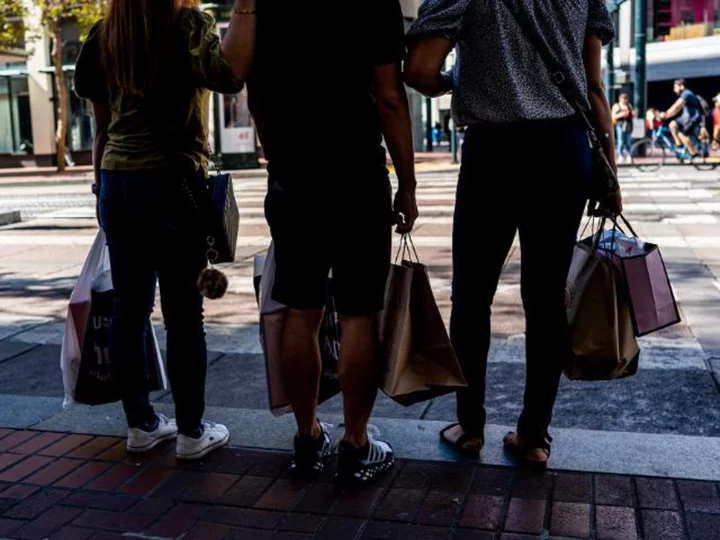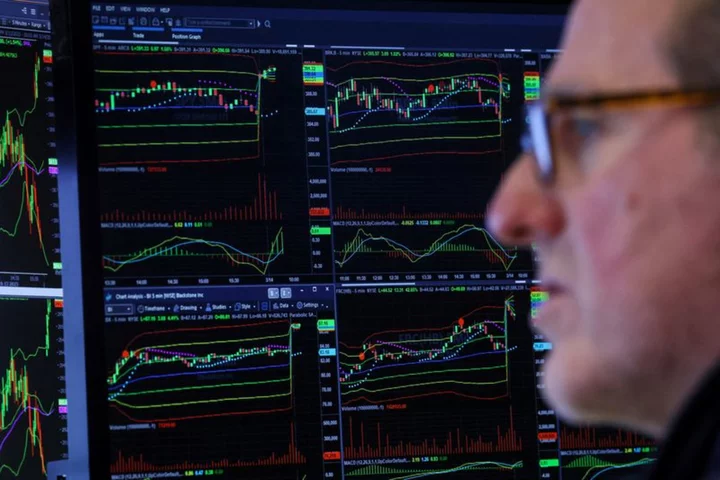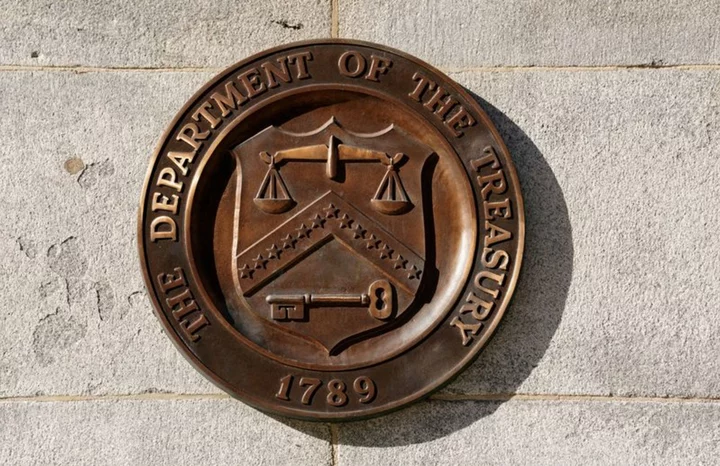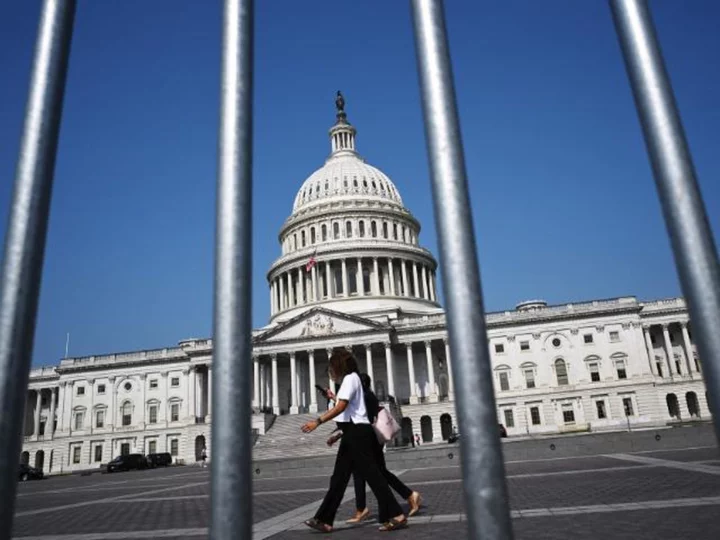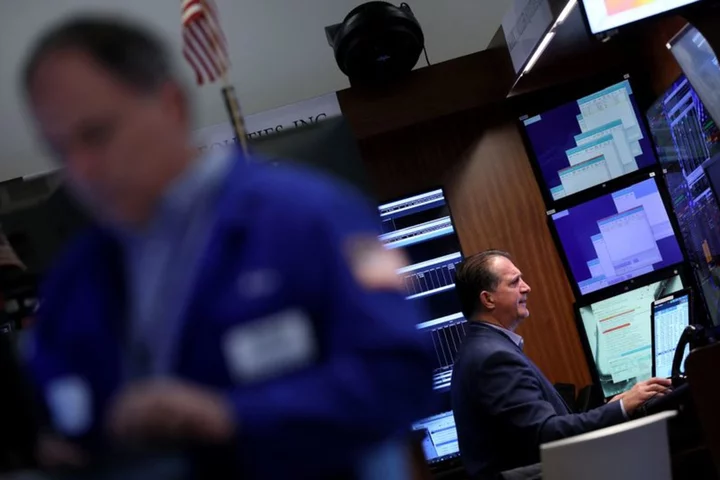There's just one thing keeping the US economy afloat: You.
Interest rates are higher and so are prices, credit is drying up and there are signs that the labor market is finally softening. But Americans keep on spending lots of money, and as long as that continues, the chance of recession remains low.
The problem is that no one, not even the Federal Reserve, knows how much longer the American consumer can keep on spending.
What's happening: The US economy expanded at a much faster pace in the first three months of the year than previously estimated, the Commerce Department reported last week. And consumer spending accounts for about 70% of America's gross domestic product, the broadest measure of the economy, so it's nearly impossible to enter a recession when spending is growing.
In theory, if people spend money, companies can keep employees in their jobs, and those workers then also can keep spending — it's the circle of (economic) life, if you will.
Over the pandemic, historic levels of stimulus cash boosted household income significantly. Spending, meanwhile, was severely curtailed as the economy shut down. Personal saving rates soared as a result, with US households amassing about $2.3 trillion in savings in 2020 and through the summer of 2021, according to Federal Reserve economists. That's about $2 trillion more than they would have saved under normal circumstances.
Now, two years later, we've done a 180. Americans are actually spending more than they normally would — using up their savings and even taking on more debt. Economists know that savings must be dissipating, but haven't quite figured out just how much of that money is left.
In a recent report, the Federal Reserve Bank of San Francisco found that Americans still have excess savings of about $500 billion. It expects that money will last "at least until the end of this year."
So recession worries are on hold until 2024. Well, maybe.
Just a few weeks later, economists at the Federal Reserve Board of Governors in Washington said just the opposite. US households have already gone through all of their excess savings, according to their research.
"While accumulated excess savings during Covid-19 were unprecedented in size, they have been unwound in the United States," they found.
Why it matters: Fed economists will need to come to some sort of agreement soon — the outlook for consumer spending is directly tied to whether the Fed hikes rates once, twice, or even three times more this year.
"This debate is very important as we discuss when the US consumer will run out of excess savings and when the higher Fed funds rate will begin to meaningfully slow down credit growth and hence consumer spending," said Torsten Slok, chief economist at Apollo Global Management.
Consumer spending rose 0.5% month-over-month in April, after taking inflation into account. That beat analyst expectations, and points to consumer endurance in the face of rising prices, tighter credit conditions and heightened economic uncertainty, said Lydia Boussour, senior economist at EY-Parthenon.
"Households are still spending, but cracks in the foundation are increasingly apparent in the form of rising debt burdens and an increasing number of delinquencies," she said. "With hiring prospects softening and credit conditions tightening, elevated prices could become prohibitive."
Resilient consumers are typically a good thing. But when the Federal Reserve is actively trying to squash high inflation rates, consumer strength may be precisely what's prolonging inflationary pressures, said Boussour.
China hits back in the chip war
We need to talk about germanium and gallium.
These elements play a crucial role in the semiconductor industry — they're the backbone of the AI revolution and the unsung heroes of the tech world. Now, China has decided to tighten its grip on exports.
This is the latest development in the global battle to control chipmaking technology, which is vital for everything from smartphones and self-driving cars to advanced computing and weapons manufacturing, report my colleagues Hanna Ziady and Xiaofei Xu.
Beijing's move comes just days after the Dutch government announced new restrictions on exports of some semiconductor equipment, drawing an angry response from Beijing, according to Reuters. The new rules mean that ASML, Europe's largest tech firm, will need to apply for export licenses for products used to make microchips.
Japan and the United States have also taken steps to limit Chinese companies' access to chips and chipmaking equipment. Italy last month imposed several curbs on Pirelli's biggest shareholder, Sinochem, to block the Chinese government's access to sensitive chip technology.
An editorial Monday in China Daily, a prominent state-owned newspaper, hinted that Beijing's new policy was retaliation for similar moves by Washington and its allies.
Critics of the decision "could ask the US government why it holds the world's largest germanium mines but seldom exploits them. Or they could ask the Netherlands why it included certain semiconductor-related products... in its export control list," the editorial said.
Beijing may not stop there, reports my colleague Laura He.
The curbs announced this week are "just the start," Wei Jianguo, a former deputy commerce minister, told the official China Daily on Wednesday, adding China has more tools in its arsenal with which to retaliate.
"If the high-tech restrictions on China become tougher in the future, China's countermeasures will also escalate," he was quoted as saying.
Funflation is the story of the summer
Welcome to the summer of Swiftflation and Beyflation — Taylor Swift and Beyoncé have both embarked on pricey tours this season and are being blamed for inflating the price of hotel rooms and goods around their concert venues.
Economists are also ringing the alarm that as Americans keep "revenge spending" on big-ticket items, inflation could remain elevated and credit conditions tight, according to analysts at Fisher Investments.
The phenomenon is global. The UK's Office for National Statistics recently reported that, "prices for recreational and cultural goods and services rose, overall, by 6.8% in the year to May 2023, up from 6.4% in April, and the highest rate since August 1991 ... The largest [increase] came from cultural services (particularly admission fees to live music events)."
Still, Fisher analysts don't think this will have any long-lasting effect on the economy. They say it's an instance of pessimism of disbelief (PoD) — a new bull market phenomenon where investors look for reasons that we might still be in a bear market.
"Rather than take the good (overall inflation is falling and consumer demand appears to be holding up) with the bad (some prices aren't stabilizing yet), economists are fixating on the bad parts. That this includes celebrity performances inevitably draws headline attention," wrote Fisher analysts.

